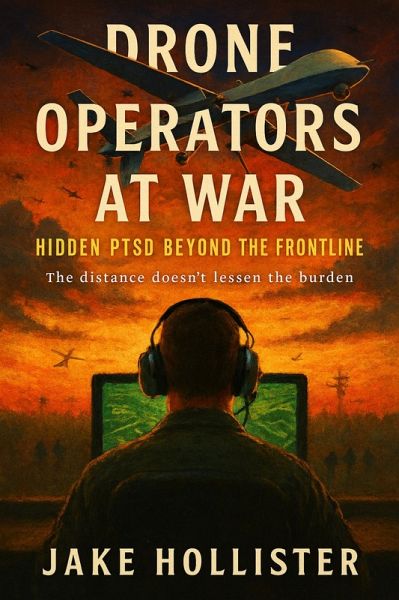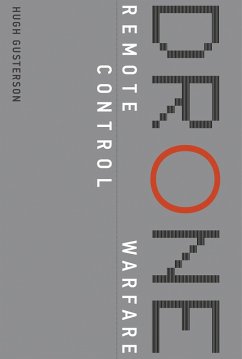
Drone Operators at War (Beyond the Frontlines, #7) (eBook, ePUB)

PAYBACK Punkte
0 °P sammeln!
Drone warfare has transformed the battlefield, but the human cost of remote combat remains largely unseen. Drone Operators at War: Hidden PTSD Beyond the Frontline unveils the psychological struggles faced by those who control unmanned aerial vehicles (UAVs) from safe, distant control rooms, yet carry the emotional weight of life-and-death decisions every day.Modern military operations increasingly rely on drone technology, placing operators in a paradoxical position: physically removed from combat, yet emotionally tethered to it. These soldiers navigate extreme cognitive load, high-stakes dec...
Drone warfare has transformed the battlefield, but the human cost of remote combat remains largely unseen. Drone Operators at War: Hidden PTSD Beyond the Frontline unveils the psychological struggles faced by those who control unmanned aerial vehicles (UAVs) from safe, distant control rooms, yet carry the emotional weight of life-and-death decisions every day.
Modern military operations increasingly rely on drone technology, placing operators in a paradoxical position: physically removed from combat, yet emotionally tethered to it. These soldiers navigate extreme cognitive load, high-stakes decision-making, and moral dilemmas that can trigger post-traumatic stress disorder (PTSD), moral injury, anxiety, depression, and emotional detachment. Unlike conventional combatants, drone operators often suffer invisible wounds, leaving them isolated, misunderstood, and in need of specialized mental health support.
This book combines rigorous military psychology research, compelling personal narratives, and real-world case studies to illuminate the challenges of modern warfare from a remote perspective. Readers will explore how operator stress manifests in sleepless nights, nightmares, ethical uncertainty, and survivor's guilt, and why traditional support systems often fail to address these unique conditions. By highlighting coping strategies, resilience-building techniques, and organizational responsibilities, the book also offers practical guidance for mental health professionals, military leadership, and families of operators.
From the evolution of unmanned combat systems to the ethics of remote strikes, each chapter investigates a crucial aspect of drone warfare. You will gain insight into the cognitive and emotional burden carried by drone operators, understand the subtle signs of trauma, and learn how military policies can evolve to better protect mental health in the age of technology-driven conflict. Drone Operators at War emphasizes that the distance of the battlefield does not reduce the weight of human responsibility, nor does it diminish the need for empathy, support, and intervention.
For anyone interested in military psychology, PTSD, moral injury, or the hidden effects of modern drone warfare, this book provides a compelling and deeply human perspective. It challenges readers to reconsider what it means to fight a war remotely and confronts the psychological impact of decisions made from afar. Whether you are a mental health professional, military scholar, policy maker, or curious reader, this work illuminates the silent battles that continue long after the drone's mission ends.
Modern military operations increasingly rely on drone technology, placing operators in a paradoxical position: physically removed from combat, yet emotionally tethered to it. These soldiers navigate extreme cognitive load, high-stakes decision-making, and moral dilemmas that can trigger post-traumatic stress disorder (PTSD), moral injury, anxiety, depression, and emotional detachment. Unlike conventional combatants, drone operators often suffer invisible wounds, leaving them isolated, misunderstood, and in need of specialized mental health support.
This book combines rigorous military psychology research, compelling personal narratives, and real-world case studies to illuminate the challenges of modern warfare from a remote perspective. Readers will explore how operator stress manifests in sleepless nights, nightmares, ethical uncertainty, and survivor's guilt, and why traditional support systems often fail to address these unique conditions. By highlighting coping strategies, resilience-building techniques, and organizational responsibilities, the book also offers practical guidance for mental health professionals, military leadership, and families of operators.
From the evolution of unmanned combat systems to the ethics of remote strikes, each chapter investigates a crucial aspect of drone warfare. You will gain insight into the cognitive and emotional burden carried by drone operators, understand the subtle signs of trauma, and learn how military policies can evolve to better protect mental health in the age of technology-driven conflict. Drone Operators at War emphasizes that the distance of the battlefield does not reduce the weight of human responsibility, nor does it diminish the need for empathy, support, and intervention.
For anyone interested in military psychology, PTSD, moral injury, or the hidden effects of modern drone warfare, this book provides a compelling and deeply human perspective. It challenges readers to reconsider what it means to fight a war remotely and confronts the psychological impact of decisions made from afar. Whether you are a mental health professional, military scholar, policy maker, or curious reader, this work illuminates the silent battles that continue long after the drone's mission ends.
Dieser Download kann aus rechtlichen Gründen nur mit Rechnungsadresse in A, B, CY, CZ, D, DK, EW, E, FIN, F, GR, H, IRL, I, LT, L, LR, M, NL, PL, P, R, S, SLO, SK ausgeliefert werden.













